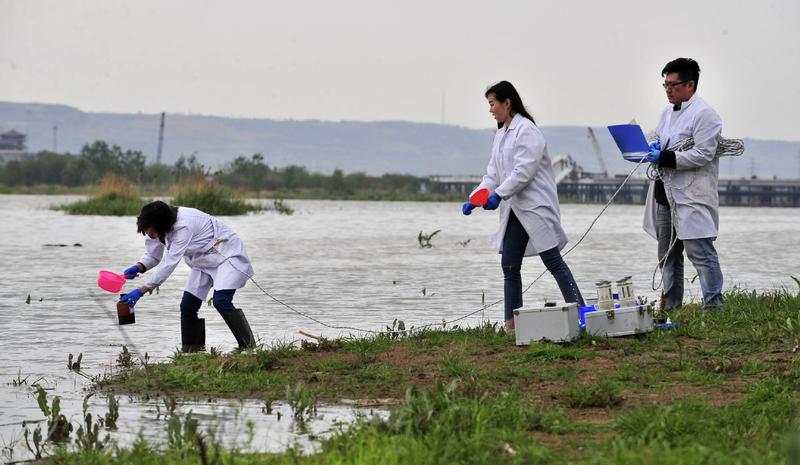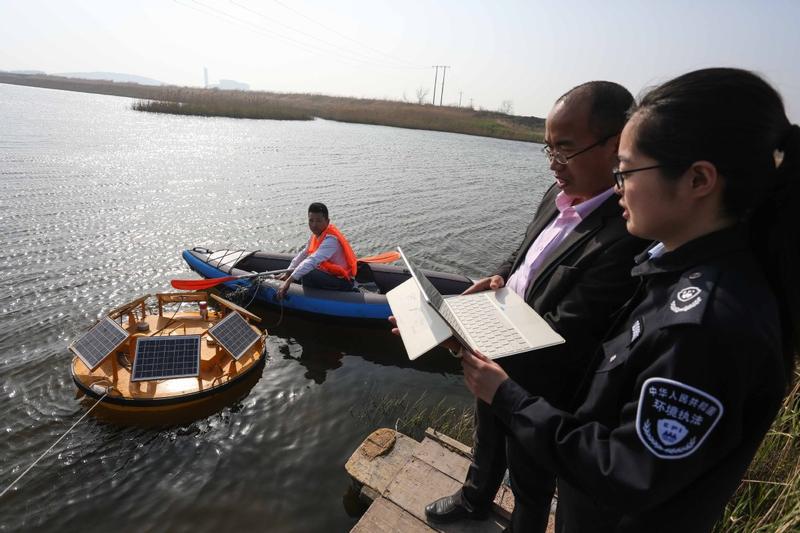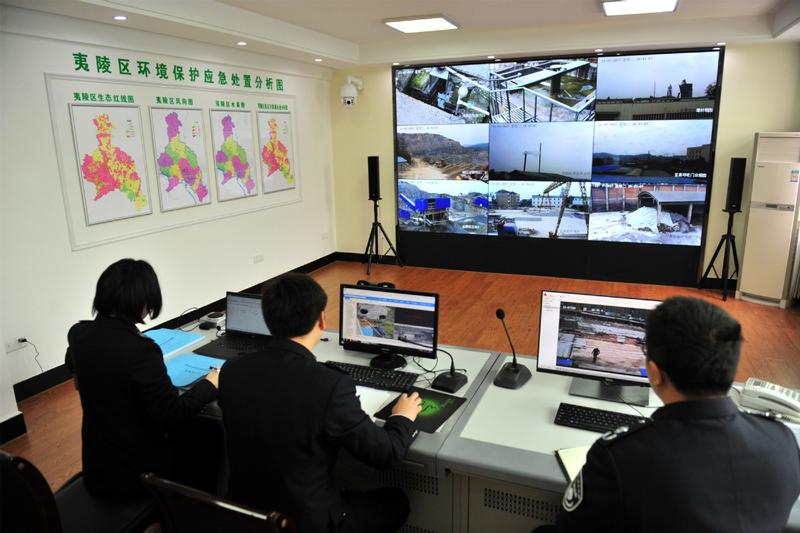 Samples are collected by engineers to test water quality in Baoji, Shaanxi province, last year. (SUN HAI / XINHUA)
Samples are collected by engineers to test water quality in Baoji, Shaanxi province, last year. (SUN HAI / XINHUA)
As China's central leader-ship attaches increasing importance to progress, environmental monitoring data has become a key factor that is taken into consideration when officials' performances are assessed by their superiors.
No data falsification can be committed without being unearthed by us.
Chen Shanrong, head of the China National Environmental Monitoring Center
Given that fact, it is little wonder that some officials have attempted to adjust monitoring facilities to make their data look better.
In one example, six automatic air quality monitoring stations in Linfen, Shanxi province, were tampered with more than 100 times from April 2017 to March 2018.
Now, though, aspirations to falsify environmental data are largely a pipe dream.
ALSO READ: Xi stresses ecological protection in Zhejiang tour
The latest technologies, such as artificial intelligence, satellite remote sensing and big data, have allowed the Ministry of Ecology and Environment, the country's top environmental watchdog, to build a closely observed environmental monitoring and data collection system that makes falsification almost impossible.
In recent years, the system has proved its efficiency by helping police unearth a series of cases of data falsification, including the one in Linfen.
There are 1,436 national-level stations to monitor air quality across the country. Each is equipped with four AI cameras, two around the automatic sample-collection apparatus and two in the control room, said Wang Taiming, an engineer with the Atmospheric Monitoring Department of the China National Environmental Monitoring Center.
"If anyone has any ideas about tampering, they should just forget it," he said.
Unauthorized entry to the restricted area triggers an alarm in the monitoring management system, he added, pointing at a computer screen that showed real-time surveillance of a monitoring station.
In a 2016 reform of the environmental monitoring system, local governments were relieved of their responsibilities for environmental monitoring to prevent illicit intervention. The duties were transferred to the national center, which is under the ministry's jurisdiction.
The installation of AI cameras is just the most visible post-reform measure the center has implemented to ensure data integrity.
At the center's headquarters in Beijing, more than 50 people keep a careful eye on real-time data from national-level air monitoring stations. They are divided into 10 teams, and each is given specific tasks aimed at ruling out false data or ensuring that no one tampers with facilities.
For example, one of the teams is responsible for overseeing the alarm system. In addition to unauthorized entry, the interruption of data transmission, which may occur as a result of power failure or an internet blackout, will trigger an alarm.
 Technicians check real-time water quality data via a collection device in Qingdao, Shandong province, in 2018. (XIE HAO / CHINA DAILY)
Technicians check real-time water quality data via a collection device in Qingdao, Shandong province, in 2018. (XIE HAO / CHINA DAILY)
"If the automatic alarm sounds, the team contacts maintenance staff and orders them to make an on-site inspection," Wang said.
He added that another special team is responsible for backup monitoring facilities. If certain facilities are found to have faults that cannot be addressed, the team ensures that backup facilities will arrive and be put into operation within four hours.
Data is transmitted to the national center's headquarters via a private network, and a separate team is dedicated to analyzing the data for any indications that may suggest falsifications the system has failed to spot.
In addition to comparing data from different stations in the same cities, the team uses satellite remote sensing and big data to search for clues that may indicate fraud, Wang said.
"At the headquarters, any work done in the system (nationwide) is traceable," he said.
Meanwhile, more attention is being paid to the monitoring of PM2.5-particulate matter so small it can enter the smallest airways-a key indicator of air pollution.
On five separate days spread over a year, the center carries out manual sample collections at each of the national-level air monitoring stations to check if their automatic facilities are operating correctly, said Tang Guigang, head of the center's Atmospheric Monitoring Department.
On each occasion, maintenance staff set up three manual sample-collection devices in each of the stations for 23 hours.
Based on weight, the data will only be accepted if they accord with each other.
The data are also compared with that from the automatic monitoring facilities to see if they need to be calibrated, he said.
"The weight of the sample-collection apparatus is recorded and uploaded directly to the system after it has been placed on weighing platforms at the center," Tang said.
Chen Shanrong, head of the center, said the work model has proven its efficiency, noting that the case in Linfen was unearthed after the team found abnormalities in data analysis and passed the evidence to the police.
Rules and regulations
In addition to these technical approaches, the center has established a series of rules to regulate people who are involved in monitoring work.
Because of the limited manpower quota allocated by the central government, the center outsources the maintenance work of all national-level air and water monitoring stations to private companies.
 Staff members monitor air quality data collected by equipment in Yichang, Hubei province, in 2017. (PHOTO / ZHANG GUORON)
Staff members monitor air quality data collected by equipment in Yichang, Hubei province, in 2017. (PHOTO / ZHANG GUORON)
Currently, more than 3,000 employees of these companies are involved in the maintenance of the stations, and the national center has published specific dos and don'ts for staff members.
According to the center, there are 1,881 national-level water quality monitoring stations across the country and all their systems work in a similar way to those that monitor air quality.
"We have a white list for these staff. None of them can communicate with local governments on issues not included in it, but the national center can," Wang, the engineer, said.
According to a nine-point don'ts list especially formulated for these staff, they cannot make use of their work to market their company's product or solicit environmental projects. They are not allowed to accept gifts from the governments of the areas in which they work or use vehicles provided by those authorities.
"Though not public servants, these 3,000-plus people are also listed as targets of national disciplinary inspections," Chen said.
If companies want to bid to do the maintenance work, they must pledge that they will work under an eight-point regulation on improving Party and government conduct that was issued by the Political Bureau of the Communist Party of China Central Committee in 2012, and also sign a letter of commitment, he added.
A special punishments clause is included in all of the center's contracts with companies that win the bids.
Under the clause, should any outside employee at the national center be punished for violating the eight-point list of regulations, his or her employer will be fined 10 percent of the money they should be paid, Chen said.
"The clause works. So far, none of the companies has dared to treat me to a meal or give me gifts," he said.
He added that the center supervises and assesses the performance of the monitoring team in a timely manner to evaluate the quality of the monitoring.
READ MORE: Green coverage grows, boosting poverty relief, wildlife protection
The center's quality control department inspects all the monitoring stations regularly, and will trace any problems identified until they have been properly rectified, he added.
"No data falsification can be committed without being unearthed by us," he said.
Contact the writer at houliqiang@chinadaily.com.cn


